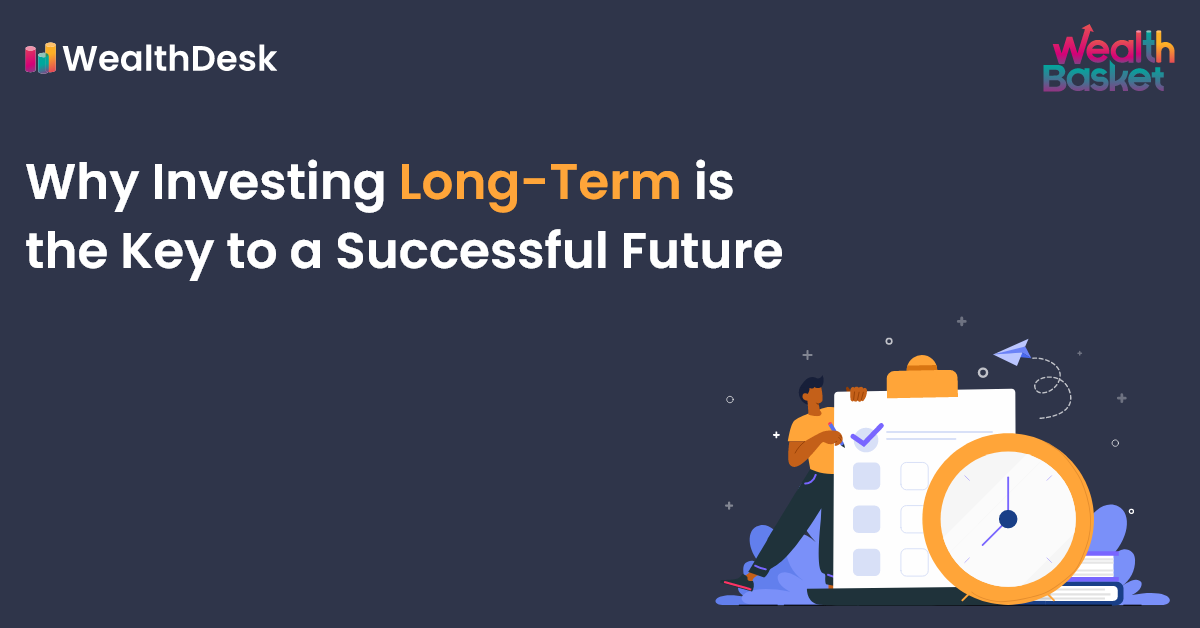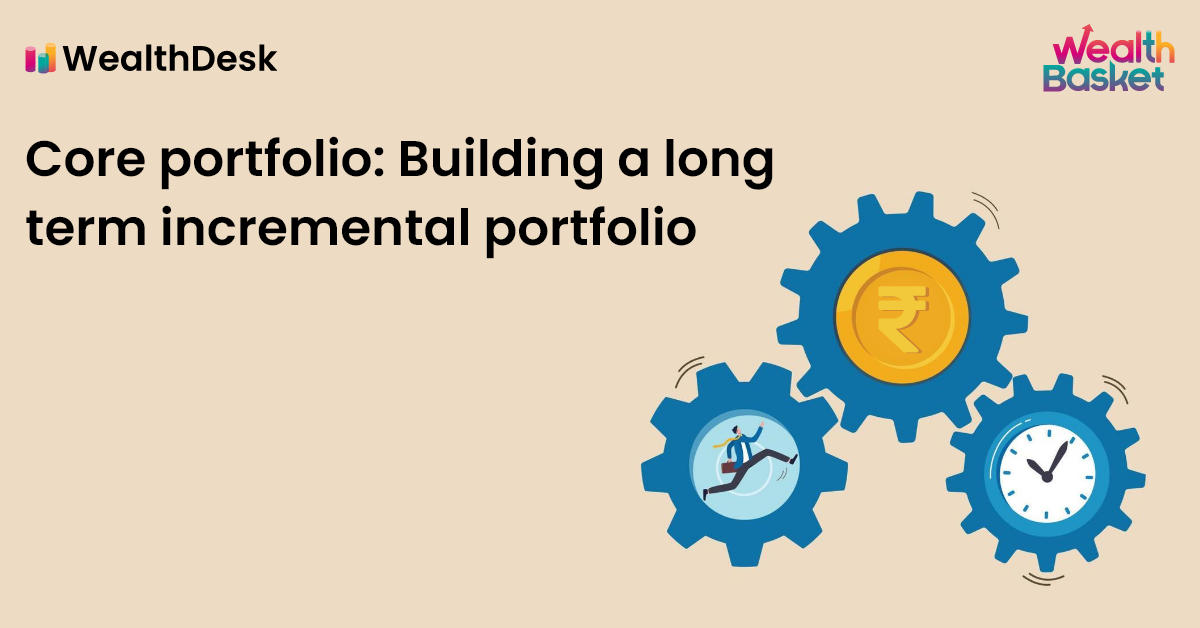“If you aren’t willing to buy a stock for ten years, don’t even think about owning it for 10 minutes.” Warren Buffet, One of the Most Successful Investors in the World.
Just as diversification is the key to optimizing the return on your portfolio, investment for a more extended period can also fetch you better returns. Bonds, equities, exchange-traded funds (ETFs), mutual funds, etc., can be considered as long-term investment options in India.
The blog explains what is considered a long-term investment, what are some long-term investment options, and why long-term investment is good for you.
Long Term Investments
Long-term investments are securities suitable to hold for more than a year or longer, and serve the work for capital preservation and return generation. Investors who are not willing to take risks or are risk-averse can benefit from long-term investment in stocks.
However, the holding period differs from one security to another, in order to be considered a long-term investment. For example, stock investment for the long term is considered when held for more than 12 months. ETFs, debt funds, bonds must be held for more than 36 months to be considered long-term investments.
What are Long-term Investment Options in India?
Investing your money is a crucial decision that can significantly influence your life in the future. It thus becomes necessary to examine various long-term investment alternatives accessible to you before deciding which one best suits your financial objectives.
Stocks
Stocks, often known as shares or equity, carry a disproportionately high level of risk. The economic status, a country’s political environment, and the company’s performance all directly influence the value of your stocks.
To invest in the stocks for the long term, you need to hold them for more than 12 months. Having stocks of good companies for more than ten years can often give you great returns.
Bonds
In comparison to stocks, bonds have relatively low volatility, and their value rarely fluctuates. While you get regular payouts, you get a relatively small yet safer return on investment (ROI).
Bonds require investment for more than 36 months to be considered as long-term investments. Holding bonds for about seven or more years usually offers better returns versus a shorter tenure.
Property
Real estate has been a popular long-term investment option in India for the past decade. However, the property investment requires huge capital and mostly requires borrowing money from banks. Thus, it has its cost of investing, but on the other hand, there are good returns, and investors barely make any loss for their investment.
Mutual Funds
Investing in mutual funds for the long term is another option for you to consider. There will be times when these mutual funds are doing exceptionally well, but certain equity-linked mutual funds may be more volatile, depending upon their investment style and risk.
Exchange-Traded Funds
ETFs (exchange-traded funds) are diversified investment funds that invest in a wide range of asset types. ETF units trade in the same way as stocks on a real-time basis. Since they track the price index, they are scattered across the securities and sectors.
Why is Long-Term Investment Good?
Many individuals who lack the expertise to engage in derivative markets, or short term trade, depend on long-term investment returns to plan their financial future. Long-term investing is likely to lead to wealth creation, and it may include dividend income from shareholding and interest received on fixed income instruments.
Better Returns
Riskier equity classes have typically outperformed their more conservative counterparts in terms of returns in the long run. Investors can determine the optimal asset class via considering several criteria, including your age, risk profile, and investing goals.
Keeps Emotions Away
If you desire to invest in the long term, you will not bother looking at the position of your portfolio every single day. Long-term investment strategy requires an ‘invest and forget’ strategy so that you can keep the emotions out of the game.
Cost-Effective
Brokerage charges and capital gains taxes make up the majority of the investment. When investors invest for the long term, they often pay lower transaction fees than short-term investors. Long-term investors can also defer capital gains payments by compounding investment returns.
Restricted Volatility
Market declines are distressing situations that often cause people to liquidate their investments instinctively. When markets recover, maintaining your investments through a downturn may payout handsomely later.
Reduced Risks
Long-term investments reduce the risks since they are invested for more than a year, hence reducing the scope of short term volatility. Eventually, as a minimum, you are expected to get your invested money and make nearly no loss. This is applicable when investors select quality companies with consistent performance.
How to Build a Long-Term Investment Strategy for Stocks?
Building a long-term strategy for equity requires clear investment goals, determination to stay invested longer, and a complete understanding of how you want to execute that. Let’s look at some of the best long-term investment strategies for company stocks you may want to consider.
Current Income Strategy
The current income strategy focuses on the large companies with huge market capitalization, such as blue-chip companies. The advantage of following this strategy is that it ensures optimized long-term returns with less volatility.
Capital Growth Strategy
The capital growth strategy maximizes the wealth invested over ten years or more. Usually, this strategy follows a diversification method by adding stocks, ETFs, and mutual funds to one portfolio. This technique is suitable for those with fixed investment goals such as weddings, retirement planning, or higher education, among others.
Balanced Investment Strategy
A balanced investment strategy combines investments in a portfolio to even out the risks and returns. Such a strategy is most suited to investors with a medium-risk appetite. They include fixed incomes instruments as well as stocks with fluctuating prices as well.
Conclusion
An excellent investment strategy to accumulate wealth
over time comes through a long-term investment option.
However, the first step is learning to think long-term
and avoid excessive monitoring of the market’s
daily ups and downs.
At
WealthDesk, our SEBI-approved investment professionals have
curated
WealthBaskets
that consist of stocks or ETFs reflecting an investment
strategy or theme.
FAQs
The longer you invest, the better your chances of weathering the market downturns. Comparatively, long-term investments have low volatility and can generate steady returns.
Setting aside money each month for investment will prevent you from squandering it. Investing your money shows that you care about the future and have the discipline to stick to a budget during your retirement years.
There are many aspects to successful investing, but one of the most promising factors that can give you a peaceful retirement is a long-term investment.


















